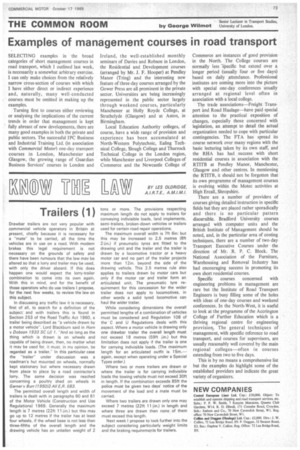Examples of management courses in road transport
Page 75

If you've noticed an error in this article please click here to report it so we can fix it.
SELECTING examples in the broad categories of short management courses in road transport, which I outlined last week, is necessarily a somewhat arbitrary exercise. I can only make choices from the relatively narrow cross-section of courses with which I have either direct or indirect experience and, naturally, many well-conducted courses must be omitted in making up the examples.
Turning first to courses either reviewing or analysing the implications of the current trends in order that management is kept fully abreast of new developments, there are many good examples in both the private and public sectors. The successful IPC Business and Industrial Training Ltd. (in association with Commercial Motor) one-day transport courses in London, Manchester and Glasgow, the growing range of Guardian Business Services' courses in London and
Ireland, the well-established monthly seminars of Davies and Robson in London, the Residential and Development courses (arranged by Mr. J. F. Hooper) at PendIey Manor (Tring) and the interesting new feature of three-day courses arranged by the Gower Press are all prominent in the private sector. Universities are being increasingly represented in the public sector largely through weekend courses, particularly Manchester at Holly Royde College, at Strathclyde (Glasgow) and at Aston, in Birmingham.
Local Education Authority colleges, of course, have a wide range of provision and experience has been accumulated at North-Western Polytechnic, Ealing Technical College, Slough College and Thurrock Technical College in the London region, while Manchester and Liverpool Colleges of Commerce and the Newcastle College of
Commerce are instances of good provision in the North. The College courses are normally less 1Pecific but extend over a longer period (usually four or five days) based on daily attendance. Professional institutes are coming more into the picture with special one-day conferences usually arranged at regional level often in association with a local college.
The trade associations—Freight Transport ind Road Haulage—have paid special attention to the practical exposition of changes, especially those concerned with legislation, an attempt to detail the actual organization needed to cope with particular contingencies. The FTA has spread its course network over many regions with the basic lecturing taken by its own staff, and the RHA has had success with short residential courses in association with the RTITB at Pendley Manor, Manchester, Glasgow and other centres. In mentioning the RTITB, it should not be forgotten that its own programme of management courses is evolving within the Motec activities at High Ercall, Shropshire.
There are a number of providers of courses giving detailed instruction in specific fields but they are placed rather sporadically and there is no particular pattern discernible. Bradford University courses arranged with computer units and the British Institute of Management should be noted, and, in the particular area of costing techniques, there are a number of two-day Transport Executive Courses under the direction of Mr. R. P. C. Block. The National Association of the Furniture, Warehousing and Removal Industry has had encouraging success in promoting its own short residential courses.
Specific courses concerned with engineering problems in management are rare but the Institute of Road Transport Engineers is busy filling some of the holes with ideas of one-day courses and weekend conferences. In the North-West, it is useful to look at the programme of the Accrington College of Further Education which is a thriving regional centre for engineering provisiol. The general techniques of management, with specific reference to road transport, and courses for supervisors, are usually reasonably well covered by the main regional colleges—often in courses extending from two to five days.
This is by no means a comprehensive list but the examples do highlight some of the established providers and indicate the great variety of organizers.




























































































































